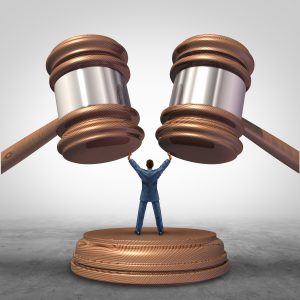 For the purposes of tax status, the Federalist Society presents itself as a nonpartisan educational group. This claim is roughly as plausible as the NCAA’s claim to be a nonprofit organization while simultaneously running March Madness, but it’s the sort of fiction everyone agrees to accept with a wink and nod when it comes to the tax status of lobbying interests.
For the purposes of tax status, the Federalist Society presents itself as a nonpartisan educational group. This claim is roughly as plausible as the NCAA’s claim to be a nonprofit organization while simultaneously running March Madness, but it’s the sort of fiction everyone agrees to accept with a wink and nod when it comes to the tax status of lobbying interests.
In reality, the Federalist Society is a well-funded political operation designed to advance contemporary right-wing policy goals through the judicial system. And to buy Chick-Fil-A for law students to own the libs.
For years, the organization has spearheaded a form of mostly white, mostly male affirmative action by offering access to the upper echelons of legal industry power to any law student willing to troll women, minorities, the poor, the LGBTQ community, or immigrants by granting them fast-tracked status to judicial clerkships with like-minded jurists and, with any luck, an opportunity to convert those clerkships into another generation of judges.

Ready for What’s Next: 5 Ways to Strengthen Economic Resilience
Get five practical tips to spot cash flow red flags early, speed up payments, track spending in real time, and build stronger client trust through clear, transparent billing—download the ebook.
A key component of this revolving door was the organization’s ready access to a plethora of friendly judges willing to lend star power to the group’s events. It was always a little unsavory and smacked of a potential ethical violation. Now a new opinion released to little fanfare may actually put some teeth to the problem.
Judge James Donohue, a former federal magistrate, highlighted this new ethical opinion in the Washington Post this week:
For many years, the Code of Conduct committee ducked the issue of judicial participation in the Federalist Society, in part, it seemed, because many powerful judges… either have been or are associated with the organization.
The committee now appears to have drawn a line with its issuance of advisory opinion No. 116 expanding the scope of prohibited political activity. The Federalist Society is not mentioned by name, but the opinion is directed to the propriety of participation by judges in programs or membership in groups engaged in public-policy debates.
Opinion 116 actually came out in February, and while few have focused on it, the committee appears to have taken direct aim at the Federalist Society’s whole business model, banning judges from appearing at certain events:

Transform Legal Reasoning Into Business-Ready Results With General AI
Protégé™ General AI is fundamentally changing how legal professionals use AI in their everyday practice.
The prohibited political activities include those involving “hot-button issues in current political campaigns” or that are “politically-oriented” or have “political overtones.” Public perception also plays a vital role, as the opinion bars judges from participation that would “give rise to an appearance of engaging in political activity” or “would otherwise give the appearance of impropriety.”
Does that sound like any originalist summer camp you know? That’s a pretty spot-on description of the Federalist Society right there, but the committee didn’t stop there, adding another layer to their indictment of judges cavorting with the group:
The committee also warned judges that they should stay away from groups “where the funding sources are unknown or likely to be from sources engaged in litigation or political advocacy.” The New York Times noted of the Federalist Society’s 2015 annual report, the organization “discloses who contributes most of its money. But it also takes anonymous contributions, from players including the Mercer family, which was a major backer of Donald Trump.” The annual report listed 14 anonymous donors on the “platinum” level — those giving $100,000 or more.
Hopefully, that FedSoc annual meeting airfare was refundable for all you judges out there.
And what of the most prominent FedSoc stooges in the American court system: Roberts, Alito, Gorsuch, and Creepy McBeermeister? The Code of Conduct for United States Judges still doesn’t apply to the Supreme Court.
The Federalist Society just became a no-go zone for federal judges [Washington Post]
 Joe Patrice is a senior editor at Above the Law and co-host of Thinking Like A Lawyer. Feel free to email any tips, questions, or comments. Follow him on Twitter if you’re interested in law, politics, and a healthy dose of college sports news. Joe also serves as a Managing Director at RPN Executive Search.
Joe Patrice is a senior editor at Above the Law and co-host of Thinking Like A Lawyer. Feel free to email any tips, questions, or comments. Follow him on Twitter if you’re interested in law, politics, and a healthy dose of college sports news. Joe also serves as a Managing Director at RPN Executive Search.